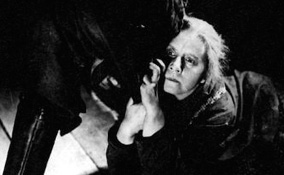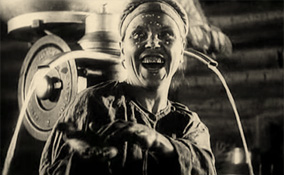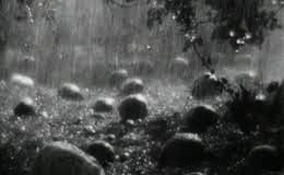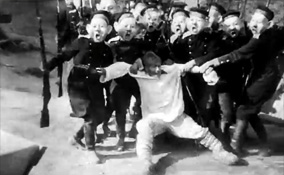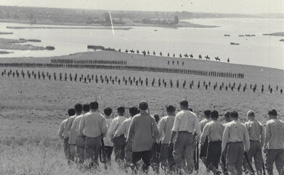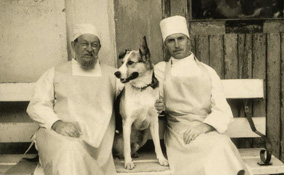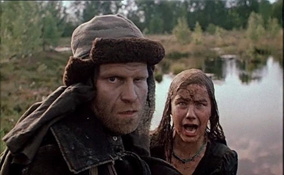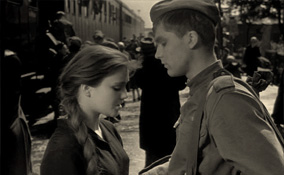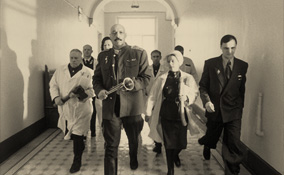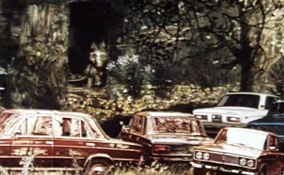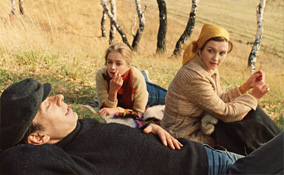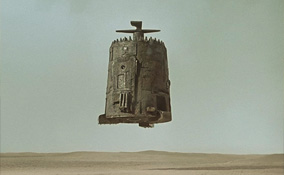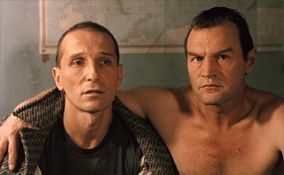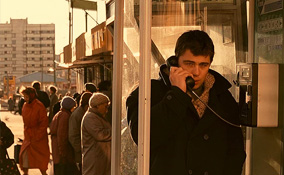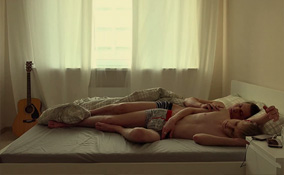<<< II
Notes on Russian films and films about Russia After 1917 Russian Revolution, Vladimir Lenin viewed film as the most important medium for educating the masses with Soviet ideologies. He systemized film business, nationalized cinemas and subjected them to censorship. The death of Joseph Stalin in 1953 gave film industry more freedom because of Nikita Khrushchev's policies of de-Stalinization, this period was called the Thaw. From 1985 onwards, Mikhail Gorbachev introduced the policies of glasnost (openness) and perestroika (restructuring) that led to dissolution of the Soviet Union in 1991. War films dominated 20th century Russia/Soviet/Russia cinema since the birth of Soviet Union. There were some interesting genres that flourished in this repressive state: satire comedy to its rigid bureaucratic regime; metaphorical sci-fi to the absurd state; and spiritually poetic films to escape from ultra-rational world. These are my favourite films representing 20th century Russia/Soviet/Russia. Another foreign-made film about another emperor, British-produced Nicholas and Alexandra (1971) is very informative and a bit tedious, especially comparing to grandiosity of Bertolucci's The Last Emperor (1987). It might works best as companion piece for David Lean's Doctor Zhivago (1965) which story happens at the same period of time. Doctor Zhivago has almost the same storyline as Zhang Yimou's To Live (1994) : from feudal states through revolutions and civil wars, to struggling lives in communist regimes. These two films (and books) show that histories and destinies of Soviet and Chinese people in early 20th century are very similar. Elem Klimov's Agony (1981) is excellent portrait of Grigori Rasputin, the self-proclaimed holy man whose influences on Tsarina and Russian politics helped igniting Russian Revolution. This almost-like-a-horror film's structure alternates between fictionalized part with actors and documentary footage. The acting section in exquisite interiors is the bubbles where elites live - Rasputin is invasion of outsider. While archival footage are people in real world with poverty, famine, protests, wars and death. These two sections occasionally blend together. Its last part is a bit too long, and it ends with celebration of communist revolution - this could be understandable since Agony was held up by Soviet authority for six years and it was changed several times until released in 1981. The Romanovs: A Crowned Family (2000) [watch part one, two] is a good film to humanize the Romanov family in the last year of their lives. It has little to add to what was told in Nicholas and Alexandra, but is very heavy Tsar-apologist. The timing of this film is more interesting - I will talk about it later below. Injustice to her Marxist son turns a peasant mother to join demonstrations against Tsarist authorities during First Russian Revolution in 1905. Vsevolod Pudovkin's Mother (1926) [watch] adapted from Maxim Gorky's novel, is simple and straightforward propaganda. A bit overrated. Old and New (1929) [watch] is absolute communist propaganda film. It tried to educate illiterate peasants by condemning superstitions with technologies, and individualism with cooperative. Though this film is not Sergei Eisenstein's best artistic achievement but very informative, sometimes feels like fantasy of a peasant's dream. If Old and New is celebration of technologies and machines, Aleksandr Dovzhenko's Earth (1930) [watch] is a celebration of lives after arrival of machines. The mechanical tracker plows through the earth, rips apart old faith and old traditions, and in the end gives births to new life and new world that prosper under socialism. Its groundbreaking poetic style survives and lasts longer than its messages. A poor peasant looks for what happiness is, in Aleksandr Medvedkin's Happiness (1935) [watch]. Told in style of Buster Keaton comedy, which is very strange for Soviet propaganda film, a loser in feudal Tsarist regime is also a loser in communist regime, but by his good heart he finally find himself happiness in superficially materialistic world. The villain in first-half of the film are Russian Orthodox church and Tsarist authorities, then it shifts to rich farmer (kulak) who becomes counterrevolutionist - this film pretty sums up villains of Soviet state. Sometimes very creative and surreal but its naive ending made me cringe. Happiness and its director are subjects of Chris Marker's documentary, The Last Bolshevik (1993) which Marker cited that this film changed his life. My favourite Nikita Mikhalkov's film, Unfinished Piece for Mechanical Piano (1977) [watch], portrays a day in the country of Russian aristocrats in early 20th century. There is a scene a servant plays piano and makes those elites feel shocked. It turns out that piano is the automatic one. This machine can play by itself, no need for any artist or intellectual - like the future of communism, it could be run by only peasants and machines. Tsarist White Army and Bolshevik Red Army (with help from Hungarian communists) are killing each other around Volga river in Miklós Jancsó's The Red and the White (1967). The enigmatic Hungarian director never explains causes of battles or backgrounds of events. There is almost no plot or real protagonist, just flows of humans moving, attacking, killing, running away and dying - everything in stunning long-takes. It definitely shows absurdity of war and fragility of life. A pregnant commissar of Red Army is forced to stay with a Jewish family until her delivery in The Commissar (1967), another film that its story happens during Russian Civil War (1918-1923). Banned for 20 years, this film is more about how bad Jewish people was treated by both sides' authorities - not sure if this is the reason it was banned or because of the ending of this film. Very impressive montages that go back and forth in time, but with little story and problematic ending. Aleksandr Sokurov's Taurus (2001) imagines the last few days in the lonely life of ailing Lenin in 1923. This very sad film about ageing and death (of a man, icon and ideology) has some surprisingly funny scenes, but I think his take on Emperor Hirohito in The Sun (2005) is better. In 1924, a professor implants pituitary gland of a criminal into the brain of a stray dog. It then transforms into human and becomes a Bolshevik! This ungrateful son (or dog) brings many troubles to his bourgeoisie father (or creator) in Heart of a Dog (1988). Adapted from Mikhail Bulgakov's novel, this satire masterpiece asks many interesting questions about human nature, family and politics. Andre Konchalovskiy's 4-hour epic Siberiade (1979) [watch part one, two] is very annoying. Its story spans 80 years in a small Siberian village where everybody talks, laughs and acts like they're drunk all the time. At its 4th hour, someone comes back to this forsaken village and that's when the whole saga starts making sense. Its satisfying ending shows some kind of political reform that predicts 1980s perestroika. Elem Klimov's masterpiece, Come and See (1985) [watch], is loss-of-innocence story of a teenage boy during German invasion of Soviet in WWII, told in style of 1970s arthouse horror, almost without blood but pale-skin bodies of those living and dead out there in the cold of Belarus. Sometimes feels too over-the-top but still legitimately showing horror of war. Tarkovsky's Ivan's Childhood (1962) [watch] has similar theme, but was told in poetic dream-like style that finally pulled down to filthy reality. The Cranes Are Flying (1957) [watch] is undoubtedly Mikhail Kalatozov's best film, it's WWII story on woman's side. His films always contain stunning montages and jaw-dropping tracking-shots, but are usually very dry. The unexpected heartwarming ending gives this film more depth. For me Kalatozov is a more dynamic genius version of Eisenstein. Ballad of a Soldier (1959) [watch] is a sweet war-time road-movie that is not about heroic actions of its protagonist but about things he left behind at home. Sergey Bondarchuk's The Destiny of a Man (1959) [watch] is a brutal POW drama that's pretty average. And I slept through Larisa Shepitko's acclaimed humanist film, The Ascent (1977) [watch]. LOL. The story of Aleksey German's divisive Khrustalyov, My Car! (1998) [watch] happens in the last day of Joseph Stalin in 1953. If you could call it story, because I'm not even sure what is going on in this film. It's beautiful, messy, loud and absurd - including its title. But it's sure representing the end of an era and death of "fathers". Nikita Mikhalkov's Oscar winner, Burnt by the Sun (1994) has similar theme but is too pedestrian. A woman and her son meet a soldier on a train in 1952. The Thief (1997) [watch] is very impressive metaphor of fatherless Russia and its love-hate relationship with Stalin. A kid who needs a role model and a mother who can never leave. Sometimes it reminds me of Nagisa Oshima's Boy (1969). (Other notable films exploring father complex are Aleksandr Sokurov's homoerotic Father and Son (2003) and Andrey Zvyagintsev's The Return (2003).) Konchalovskiy's recent Dear Comrades (2020) is very good film about troubled Soviet bureaucratic hierarchy that led to disaster in 1962 demonstrations. Dear Comrades intentionally shows a mother who is a faithful believer of Soviet ideologies, converts to being doubtful in the end. Three members of this family obviously stand for three different ideologies, this makes its ending feels predictable and forced. But that massacre scene is phenomenon. Dear Comrades is obviously reverse version of Pudovkin's Mother (1926). I Am Twenty (1965) shows everyday lives of three friends in their 20s circling around streets of Moscow. They are enjoying short freedom of Khrushchev's Thaw in early 1960s while talking and dealing with their life crises. This is the generation of fatherless Soviet who lost their fathers in war. Its title could be age of people or age of postwar Soviet state from the end of WWII. I Am Twenty is nearly 3-hour long, you have to wait patiently till its last 30 minutes when our protagonists finally grow up and the narrative shifts to the next level. This is nationalist film but very intelligent one. A love letter to Moscow. Highly praised short-animation, Tale of Tales (1979) [watch] tells 20th century Russian history in nostalgic dream-like style through the eyes of a little grey wolf. (Its original title is The Little Grey Wolf Will Come, but it was rejected by film censorship.) I have to admit that I don't understand this beautiful film. It symbolizes history through some objects that fly in and fly out of the frames. Though it's very obvious that these objects are symbols but most of the time I don't get them. Ink and papers (intellectuals?), sewing machines (communist ideology?), apples (fallen soldiers?), Napoleon hats (Stalinism?), or speeding cars (materialism?), the filmmaker once said there is no metaphor in this film, only memories... Whatever. Moscow Does Not Believe In Tears (1980) [watch], another Oscar winner, tells beautiful love stories of three women from 1958 to 1980. A wonderful film to ensure you that love will find a way to meet you eventually. But this film is very thin on social and political changes along its timeline. There certainly are cultural and political contexts underneath a simple plot of hugely beloved comedy, Mimino (1977) [watch], about a Georgian and an Armenian accidentally meet in Moscow and go through adventurous chain of events. But as someone mentioned, you need to know Russian language to understand them. This also happens with famous cult film, Kin-dza-dza! (1986) [watch], from the same director, a low-budget sci-fi about two Soviet guys (an arrogant Russian engineer and a Georgian thief) accidentally transported to planet Pluk in galaxy Kin-dza-dza, where they're struggling in its strictly hierarchical system while trying to get back home. Here, Earth represents a bit freer Soviet state in glasnost period while Pluk is barbarian society under authoritarian. Many subtexts are lost in translation. A messenger boy's life before the fall of Soviet Union is depicted in Kuryer (1986) [watch]. This film resembles Ivan Turgenev's Fathers and Sons (1862) in a weird way. In Turgenev's book, it's arguments between fathers' generation of intellectual elite and hardworking farmer versus sons' generation of angry nihilists that will lead to Russian revolution. While in this film it's between older communist middle class and younger generation that has nothing to hold on to, in the society that is falling apart. Assa (1987) [watch] has similar theme about rebellious teens against adult generation involving corruptions and mafias. This cult film is depicted in very fresh style but slow and its story is not interesting and falls all over the place. I almost wrote this one off, until its last scene with performance of the song, "Changes". Wow. This ending changes everything. It gathers every piece on the floor together and makes a perfect conclusion about spirit of perestroika youth. Wow. I'm impressed. Taxi Blues (1990) explores love-hate relationship of a hardworking taxi driver and a free-spirit musician as they are metaphors for macho communist-Soviet and Westernized new-Russia. It's an important film about last stage of perestroika before the fall of Soviet Union and the birth of Russian Federation, now full of corruptions, black markets, Western cultures and sexual decadence. These two Russia(s) need each other in difficult times, the musician is genius part while the taxi driver is its backbone. Problem is - the whole film is a metaphor, so this relationship is not very convincing in real life. (Vladimir Putin recently reveals he moonlighted as a taxi driver after Soviet Union collapse in early 1990s. This whole metaphor comes to life.) Propaganda media usually uses symbols to make ideologies easy to understand. And since you cannot express openly in strict authoritarian state you have to learn skills to look for clues, hints and codes in everyday lives. This may explain why many Soviet films I watched are metaphors. (Actually I think great metaphor must rely on good story that could stand alone. Audiences should be able to appreciate story without realizing about symbols.) Aleksey Balabanov's brutal Brother (1997) is the answer to 1980s-1990s political and social uncertainties (and three films above), it suggests survival of the strongest in this capitalist Russia, where law and order are things in the past. The protagonist finally sets his feet firmly on the new ground of new Russia, now embracing chaos, crimes, mafias, drugs and moral ambiguity. He is also the generation that was affected by wars that explode after collapse of Soviet Union. Adapted from Leo Tolstoy's short story, Prisoner of the Mountains (1996) is a simple and good film about 1994-1996 First Chechen War where two Russian soldiers were taken hostages in a Muslim village. The protagonist was played by Sergey Bodrov who later played ex-militant from Chechen War in Brother (1997). In famous religious film, Ostrov (2006) [watch], a man committed sin during WWII, and survived by help from Russian Orthodox monastery, he then converted to be a priest. I expected this film to be a philosophical film about religion, but it actually is a very superstitious one. Its main story happens in 1976, when a Soviet admiral seeks for a holy man to cure his insane daughter. That time was still in the Dark Age for Russian Orthodox church who was repressed, bullied, imprisoned and killed since Russian Revolution. Until late 1980s that the church started to revive and now has gained very strong power in Russia's politics. Ostrov feels like revenge to Soviet communist era. In 1981 Russian Orthodox Church canonized Romanov family as martyred saints amid controversies. They were canonized again as passion bearers (other kind of saint) in 2000 with more success. It was the year The Romanovs: A Crowned Family (2000) was theatrically released. This Tsar-apologist film ends with canonization ceremony in Orthodox Church. The Romanovs also completely omits influences of Rasputin (member of the church) from the story. You I Love (2004), Winter Journey (2013) and Siberia And Him (2019) are only queer films from this country's whole film history, that were recognized by international film festivals, among those bad news about LGBTQ lives in Russia. In June 2013, Russia passed a federal law banning the distribution of "propaganda of non-traditional sexual relationships" to minors, which directly criminalizes homosexuality. Welcome to Chechnya (2020) is documentary about those brutalities against their lives. Though Eisenstein's homosexuality is open secret in film history it's still taboo subject in Russia. His love affair with a mexican guy while he was there making ¡Que viva Mexico! (1932) [watch], was fictionalised in Peter Greenaway's Eisenstein in Guanajuato (2015). Greenaway theorized that is why Eisenstein's work changed dramatically in tone after his experiences in Mexico. His later movies are more human and more intimate – and less propagandistic. [source] If I do cheating I would add recent British series, Chernobyl (2019), to complete this list.
********
My favourite films from Russia/Soviet/Russia are: Andrei Rublev (1966,
Andrei Tarkovsky) [watch part one, two] My favourite film directors from Russia/Soviet/Russia are:
********
P.S. These are very tricky lists since I guess Belarusian, Georgian or Ukrainian wouldn't want to be on the same list with Russian now.
Read further...
Watch more...
Posted: Jan 2022
<<< II
|
||
 |
||
